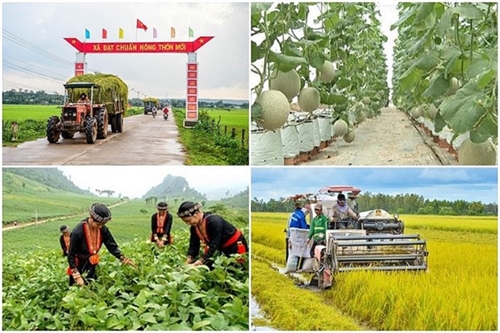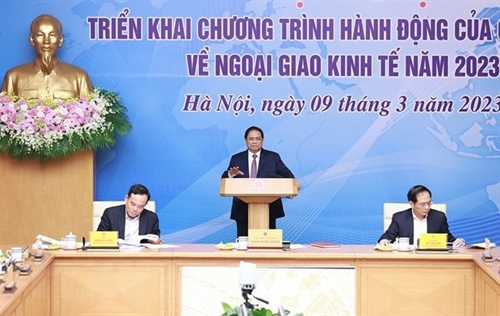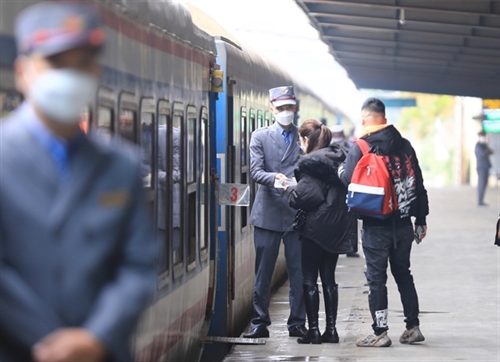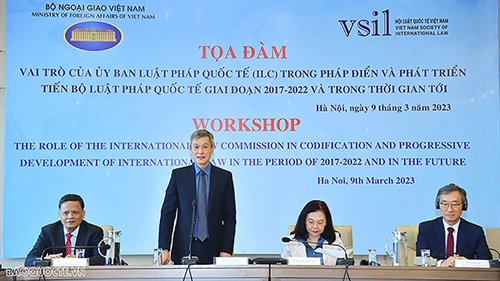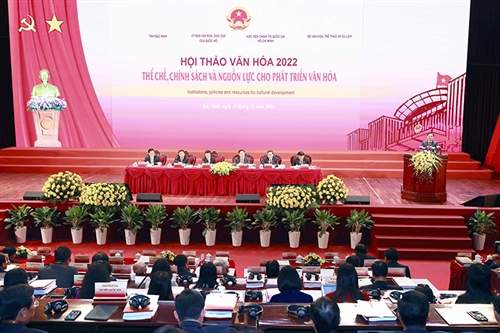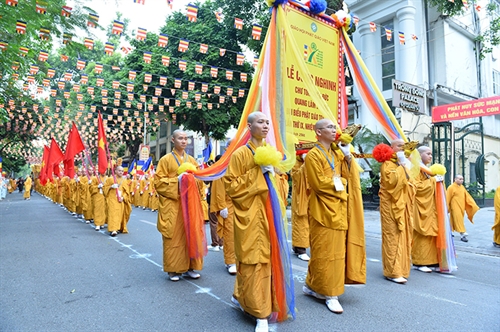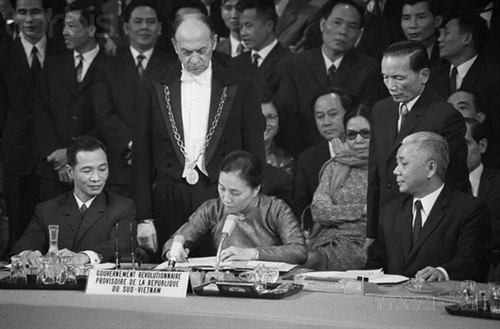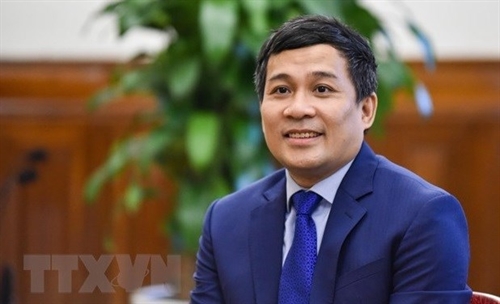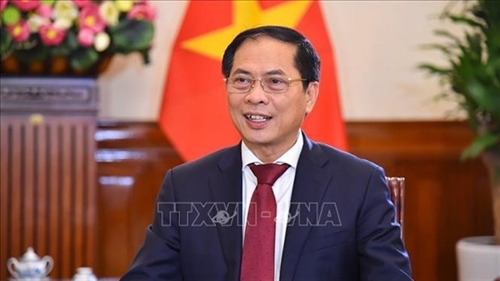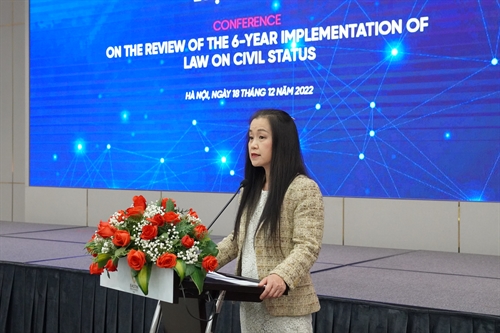On November 9, 2022, the 6th plenum of the 13th Party Central Committee adopted Resolution 27-NQ/TW on continuing to build and complete the Vietnamese socialist rule-of-law state in the new period. Vietnam Law & Legal Forum magazine would like to introduce to readers the full text of this Resolution.
SITUATION
Through over 35 years of “doi moi” (renewal) and more than 30 years’ materializing the Platform on national construction in the period of transition to socialism (the 1991 Platform, supplemented and developed in 2011), the building of the Vietnamese socialist law-governed state of the people, by the people and for the people under the Party’s leadership has been crowned with very important achievements. The perception and theory on the Vietnamese socialist law-ruled state have become more and more unanimous, complete and profound. The legal system has been basically completed; the role of law and law enforcement has been given greater attention in the organization and operation of the State and society. The mechanism of assignment, coordination and control among state agencies in exercising the legislative, executive and judiciary powers has become increasingly clearer and seen positive improvements. The state apparatus has been incrementally streamlined and operated effectively and efficiently. The organization and operation of the National Assembly have been further renewed with higher quality. The Government’s activities have become proactive and active, with a greater focus on macro management and administration, removal of hurdles, serving and support of development. Administrative reform and judicial reform have seen breakthrough developments in certain areas. The organizational apparatuses of people’s courts, people’s procuracies, investigation bodies, judgment execution bodies, and judicial assistance agencies have been further strengthened with higher operational quality. The human rights and citizens’ rights prescribed by the Constitution have been concretized by law and better exercised in reality; direct democracy and representative democracy have been enhanced. Activities of the Vietnam Fatherland Front and socio-political organizations have been gradually renewed. The model of the Vietnamese socialist law-ruled state has been constantly improved, operating according to the mechanism that “the Party exercises the leadership, the State performs the management and the people act as the master”, thus making important contributions to the great achievements of historic significance of the renewal cause and national construction and defense.
However, the building of the Vietnamese socialist law-ruled state has been hamstrung with limitations and constraints, in some aspects failing to meet the national development, management and defense requirements in the new situation. A number of theoretical and practical issues have not yet been fully and convincingly expounded; the organization of the state apparatus and legal system have revealed a number of inadequacies, still failing to satisfy practical requirements. The state power has not yet been effectively controlled and the power control mechanism is still incomplete; the oversight role of the Vietnam Fatherland Front, socio-political organizations and the people has not yet been vigorously promoted; the sense of law observance among a section of cadres, civil servants, Party members and the people has not been high; the mechanism to guarantee the people’s mastery, human rights and citizens’ rights has not been fully implemented in some aspects; administrative reform and judicial reform have not met the national development requirements, etc.
The above-mentioned limitations and inadequacies are mainly due to the reasons that the building of the Vietnamese socialist law-ruled state is a broad, complicated and protracted issue; the review of practical work, research and theorization have not yet received due attention; the political will, leadership and direction of a number of Party committees, Party organizations and administrations in realizing the guidelines and tasks of building and completing the Vietnamese socialist law-ruled state have not been commensurate with the set requirements.
VIEWPOINTS
- To persistently pursue, creatively apply and develop Marxism-Leninism and Ho Chi Minh Thought; to stick to the goal of national independence and socialism; to persistently follow the renewal line and ensure the Party’s leadership and ruling. To firmly grasp and properly handle the major relationships between the Party’s leadership, the State’s management and the people’s mastery; between the State, the market and the society; between the practice of socialist democracy and enhancement of legal institutions and assurance of social discipline. Continuing to build and complete the Vietnamese socialist law-ruled state of the people, by the people and for the people under the Party’s leadership is the focal task of renewal of the political system and must always be placed as part of the Party building and rectification work and building of a clean and robust political system; to bring into play the strength of the great national unity and involve the whole political system with high determination, great efforts, and resolute, persistent and efficient action; to successfully carry out the cause of national construction and defense for the goal of a prosperous people and a strong, democratic, equitable and civilized country.
- To persistently uphold the principle that all state power belongs to the people, promoting the people’s mastery in the Vietnamese socialist law-ruled state; the state power is unified, with clear-cut assignment, close coordination and effective control between state agencies in exercising the legislative, executive and judiciary powers under the people’s oversight.
- To guarantee the supremacy of the Constitution and law. The Vietnamese socialist law-ruled state is organized and operates under the Constitution and law, manages the society by the Constitution and law while attaching importance to the socialist morality education and enhancement; promptly and fully institutionalizes and efficiently realizes the Party’s guidelines and line; takes people as the center, goal, subject and driving force of national development; the State respects, guarantees and protects human rights and citizens’ rights.
- To closely follow the practical situation of the country and the development trend of the time, perpetuate the recorded achievements and selectively absorb international experiences suitable to Vietnam; to combine the national strength with the strength of the time, the country’s strength with the international strength; to ensure to the utmost the state-nation interests, firmly defending national independence, sovereignty, unity and territorial integrity, national security, and the socialist regime.
- To ensure that legislative renewal, administrative reform and judicial reform are carried out in a holistic, synchronous and interconnected manner; to harmoniously combine continuity and stability with renewal and development; to implement this work in an expeditious, strict and consistent manner with focuses and priorities, clear roadmaps and steady steps. Matters which are required by reality, already clear and testified as correct by reality, and concluded with high unanimity will be resolutely implemented; matters which remain unclear and controversial will be further studied, practically reviewed and implemented on a pilot basis when so permitted by competent authorities; guidelines which have been implemented but proved unsuitable will be studied for timely adjustment and improvement.
OBJECTIVES AND FOCUSES
Objectives
General objectives
To complete the Vietnamese socialist law-ruled state of the people, by the people and for the people, led by the Communist Party of Vietnam; to build a complete legal system to be strictly and consistently enforced; to observe the supremacy of the Constitution and law, and respect, guarantee and effectively protect human rights and citizens’ rights; the state power is unified, with clear-cut assignment, close coordination and effective control, professional, rule-of-law and modern administration and judicial systems; a tidy, elite and clean state apparatus operating effectively and efficiently; a contingent of fully qualified, capable, truly professional, honest and righteous cadres, civil servants and public employees; a modern and effective state governance, meeting the requirements of fast and sustainable national development, turning Vietnam into a socialist-oriented developed country with high income by 2045.
Specific objectives toward 2030
- To basically complete mechanisms to uphold the people’s mastery, and guarantee and protect human rights and citizens’ rights. The supremacy of the Constitution and law will become the standard norm of conduct of all subjects in the society. The legal system will be democratic, equitable, humane, complete, synchronous, unified, timely, feasible, public, transparent, stable, and accessible, paving the way for innovation and sustainable development and the law enforcement organization mechanism will be strict and consistent. To improve the mechanism of assignment, coordination and control between state agencies in the exercise of legislative, executive and judiciary powers, ensuring that the state power is unified and effectively controlled.
- To further renew the organization and raise the operational quality of the National Assembly; to ensure that the National Assembly is truly the highest representative body of the people, and the supreme state power agency, performing more effectively its constitutional functions and tasks.
- To basically complete the building of a people-serving democratic, law-ruled, professional, modern, clean, strong, public and transparent state administration system; to ensure that the Government is the supreme state administrative body, exercising the executive power, and is the executive body of the National Assembly; to ensure the reasonable power decentralization and delegation between the central government and local administrations; to basically complete the organizational apparatus of local administrations.
- To basically complete the building of a professional, modern, equitable, strict and upright judicial system serving the Fatherland and the people, protecting justice, human rights and citizen’s rights, safeguarding the socialist regime, and protecting the State’s interests and the lawful and legitimate rights and interests of organizations and individuals.
- To organize a basically streamlined state apparatus that operates effectively and efficiently; to build a contingent of fully qualified, capable, professional, honest and righteous, public-spirited and impartial cadres, civil servants and public employees.
Focuses
- To improve the legal system and mechanisms for strict and consistent law enforcement; to ensure the supremacy of the Constitution and law; to raise the quality of legal staff.
- To improve the mechanism for control of state power, stepping up the prevention and combat of corruption and negative practices; to continue accelerating the administrative reform, intensifying the power decentralization and delegation, clearly defining the functions, tasks and powers of organizations and individuals in the state apparatus in couple with raising their performance capacity; to build and organize a streamlined state apparatus operating effectively and efficiently.
- To promote the judicial reform, ensuring the courts’ independent operation according to their adjudicating jurisdiction and that judges and jurors perform adjudication tasks independently and only in accordance with law.
TASKS AND SOLUTIONS
Stepping up dissemination and education work for higher awareness about the Vietnamese socialist law-ruled state
- To intensify the practical review, research, formulation and finalization of the system of theories on the Vietnamese socialist law-ruled state. To reach an unanimous perception about the characteristics of the Vietnamese socialist law-ruled state, accordingly: the Vietnamese socialist law-ruled state is led by the Communist Party of Vietnam; is a state of the people, by the people and for the people; the human rights and citizen’s rights are recognized, respected, guaranteed and protected by the Constitution and law; the State is organized and operates according to the Constitution and law, and manages the society by the Constitution and law; the state power is unified, with clear-cut assignment, close coordination and effective control between state agencies in the exercise of legislative, executive and judiciary powers; the legal system is democratic, equitable, humane, complete, synchronous, unified, timely, feasible, public, transparent, stable and accessible, which is strictly and consistently enforced; courts are independent according to adjudicating jurisdiction, judges and jurors conduct trials independently and only in accordance with law; treaties to which the Socialist Republic of Vietnam is a contracting party are upheld and their implementation is guaranteed, and the state-nation interests are ensured to the utmost on the basis of the fundamental principles of the United Nations Charter and international law.
- To step up dissemination and education work for higher awareness among officials, Party members and the people about the Constitution and law, about the Vietnamese socialist law-ruled state and the requirements and tasks to continue building and improving the Vietnamese socialist law-ruled state in the new period. To build up a profound understanding that the building and completion of the Vietnamese socialist law-ruled state is the central task of renewal of the political system, which shall be carried out synchronously with the practice of socialist democracy and the development of a socialist-oriented market economy.
Guaranteeing the people’s mastery, the supremacy of the Constitution and law, the respect, assurance and protection of human rights and citizens’ rights
- To fully institutionalize and correctly and effectively apply the mechanism that the people exercise the state power through direct democracy and representative democracy, particularly grassroots democracy. To review the implementation and study the improvement of legal provisions toward better promoting forms of direct democracy of the people; to work out mechanisms to ensure the exercise of the people’s rights to participate in discussions and to make petitions on grassroots, local and national issues to state agencies; to ensure publicity and transparency of, in the receipt, handling, and settlement and response to, the people’s opinions, petitions, reports, complaints and denunciations. To renew the election mechanism so as to select persons who deserve to represent the people; to study the voting by Vietnamese living abroad, clarifying cases in which such persons are ineligible to vote. Democracy promotion must couple with strengthening of legal institutions, upholding of social ethics and civic responsibility, maintenance of discipline and order, resolute fighting against manifestations of extreme democracy or nominal democracy; to strictly handle all acts of abusing democracy to breach the State’s interests and the lawful rights and interests of organizations and individuals or infringe upon the national security and social order and safety.
- To build up the sense and lifestyle of upholding the supremacy of the Constitution and law in the political system and the whole society; to include appropriate contents on the Constitution and the Vietnamese socialist law-ruled state in training and further training programs of the national education system. To heighten the sense of responsibility and capacity of officials, Party members, civil servants and public employees in the enforcement of the Constitution and law. To concretize and formulate mechanisms for all subjects to fully perform their rights and responsibility to safeguard the Constitution.
- To continue to institutionalize and promptly and fully concretize the Party’s viewpoints and guidelines and the constitutional provisions on human rights, and fundamental rights and obligations of citizens; to integrate the treaties on human rights to which Vietnam has acceded into national laws; to clearly define the responsibility of state agencies to respect, guarantee and protect human rights and citizens’ rights. To properly adhere to the principles that citizens are entitled to do anything that is not banned by law; citizens’ rights are not separated from their obligations, and the exercise of human rights and citizens’ rights must not infringe upon the state-nation interests as well as the lawful rights and interests of organizations and individuals.
Further improving the legal system and mechanisms for strict and efficient law enforcement, meeting the requirements of fast and sustainable national development
- To build a democratic, fair, humane, complete, timely, synchronous, consistent, public, transparent, stable, feasible and accessible legal system, which is fully capable of regulating social relations, taking the lawful and legitimate rights and interests of the people, organizations and enterprises as the center and promoting innovation. To concentrate on completing the legal system in all domains, promptly removing difficulties and hurdles, unlocking and promoting all potentials and resources, creating a new impetus for fast and sustainable national development. Particularly, to improve the law on organization and operation of the state apparatus and political system; to promote democracy, and guarantee and protect human rights and citizens’ rights, the socialist-oriented market economy institutions, and the relationship between the State, the market and the society; to develop education and training, science and technology; to develop human resources, attract and put talents in important positions; and in the domains of culture, information, communications, sports, healthcare, social security, environmental protection, adaptability to climate change; development of green economy, digital economy and circular economy; justice, national defense, national security, and social order and safety; external relations and international integration.
- To continue to renew and improve the lawmaking process, ensuring professionalism, scientificity, timeliness, feasibility and efficiency. To define more clearly the policy-making process, clearly determining the law-making process and process of making sub-law documents. To promote dynamism, creativity, activeness and role and responsibilities of all subjects, especially the Government, in the law-making process. To bring into play the role of the Vietnam Fatherland Front, socio-political organizations and the people, experts and scientists participating in lawmaking work. To improve the mechanism for social criticism, making of replies to the people’s opinions and giving of explanations about the replies with regard to draft legal documents. To ensure synchrony and timeliness in policy- and law-making work between the National Assembly and the Government, among ministries, and between the central government and local administrations. To diversify sources of law, giving prominence to laws, simplifying, and reducing levels and types of documents in the system of legal documents. To correctly and clearly determine agencies competent to promulgate legal documents, minimizing the promulgation of ordinances as legal norms; to include to the maximum national important issues in laws that fall under the jurisdiction of the National Assembly. To intensify the building of laws with specific contents and direct effect; to redress the instability of laws and delayed issuance of detailing and guiding documents. To intensify examination and supervision work and handling of unlawful legal documents; to tighten discipline and order and heighten the responsibility, especially that of units’ heads, resolutely fight negative practices and “group interests” in lawmaking work.
- To continue renewing law dissemination and education activities. To build more capable legal service, legal aid and legal support networks for facilitating the people’s and enterprises’ access to law. To renew the law enforcement mechanism, closely combining law making with law enforcement to ensure that laws are enforced justly, strictly, consistently, promptly, effectively and efficiently. To clearly define the responsibility of organizations and individuals, especially units’ heads, in organizing law implementation. To strengthen law interpretation regulations. To enhance supervision, examination and inspection in order to detect and strictly and promptly handle law-breaking acts; to enhance law implementation in important fields related to the people’s essential interests; to strengthen the mechanism for promptly and efficiently receiving and handling petitions and reports of the people and enterprises.
- To develop legal human resources and modernize law-making and law enforcement methods and means. To consolidate legal affairs organizations; to raise the capacity, qualifications and political stuff of cadres and civil servants engaged in lawmaking and law enforcement work. To develop legal science and raise the quality of law research and training institutions. To work out appropriate mechanisms to ensure and increase resources for investment, and renew the mechanism for allocation and efficient use of funds for lawmaking and law enforcement activities.
Further renewing the organization and raising the operational quality of the National Assembly
- To continue building the National Assembly to be truly the supreme representative body of the people, representing their will and aspirations, and the supreme state power body; to promote democracy, rule of law, modernity, professionalism, scientificity, publicity, transparency, effectiveness and efficiency in its organization and operation, ensuring that the National Assembly well performs the functions of making laws, deciding on national important issues and supreme oversight of the State’s activities.
- To give prominence to the central role of National Assembly deputies; to heighten their performance quality and efficiency, meeting the requirements on standards and structure of National Assembly deputies; to rationally increase the number of full-time National Assembly deputies, and reduce the number of National Assembly deputies working in executive and judiciary agencies. To link the responsibility of National Assembly deputies to their electorates and voters; to vigorously renew the contents and forms of National Assembly deputies’ meetings with voters; to improve the mechanism of voters’ oversight and the mechanism, methods and criteria of evaluation of National Assembly deputies; to ensure conditions for National Assembly deputies to properly perform their central role.
- To continue renovating the organization and operation of the National Assembly in the direction of reasonably increasing its sessions; to consolidate the organization and heighten the operational efficiency of the National Assembly Standing Committee to properly perform its functions and tasks prescribed by the Constitution; to uphold the position and role of, and consolidate the organization and raise the operational capacity of the Ethnic Council and Committees of the National Assembly, as well as agencies of the National Assembly Standing Committee toward clear definition, proactivity, responsibility, specialization and alertness; to strengthen the institutions on National Assembly Secretary-General and Secretariat; to build e-National Assembly.
- To continue with substantive renewal, quality and efficiency improvement of legislative activities, ensuring the national governance by the Constitution and law and meeting the requirements of international integration.
- To conduct further research so as to determine more clearly the scope, objects, modes and forms of the National Assembly’s supreme oversight suitable to reality; to raise the quality of activities of questioning, expounding and overseeing legal documents, attaching importance to monitoring and urging the realization of petitions after the oversight; to strictly carry out the National Assembly’s taking of votes of confidence.
- To renew the process of deciding on the state budget, ensuring it is a substantial process in couple with budget implementation supervision, step by step replacing resolutions with laws on finance and budget.
Party Central Committee sets out major tasks and solutions for further improving the socialist law-ruled state in the coming time
Continuing to properly implement the President institution under the Constitution
To correctly, fully and deeply understand the position, powers and tasks of the President in the role as the head of state. To continue research to clarify the tasks and powers of the President in the role as the supreme commander of the armed forces, chairperson of the National Defense and Security Council, in domestic and external activities, in relation with the National Assembly, Government, people’s court and people’s procuracy in accordance with the Constitution.
Further renewing the organization and operation of the Government and local administrations; building a people-serving, professional, law-ruled, modern, effective and efficient state administration system
- To continue renewing the organization and operation of the Government and local administrations toward being streamlined and effective and efficient operation; to organize multi-branch and multi-sector ministries and specialized agencies; to rationally reduce the number of ministries, ministerial-level agencies and specialized agencies under provincial- and district-level People’s Committees. To enhance the role and heighten the responsibility of ministers in the capacity as cabinet members in macro-management and policy making. To adhere to the principle that one task is assigned to only one agency with the prime responsibility, while related agencies coordinate in its performance; to step by step abolish the interdisciplinary coordination mechanism in connection with clear definition of the responsibility of units’ heads. To bring into full play the position and role of the Government as the highest state administrative body, exercising the executive power, operating as the executive body of the National Assembly; to give prominence to promoting its proactivity and creativity, focusing on macro-management, formulation of policies, laws, strategies, master plans, plans, and inspection and supervision tools, ensuring the consistency, smoothness, discipline and order, effectiveness and efficiency of the national administration system. To renew national governance to be modern, effective and efficient, focusing on development management; to guarantee the supremacy of the Constitution and law, raising transparency, accountability and involvement of the people.
- To clearly define the position, role, competence and responsibility of the Government in legislative work and its performance, increasing the policy response capacity; to ensure the proactive participation, close coordination and greater control of the Government over the national administration system and the exercise of legislative power.
- To build up a people-serving democratic, law-ruled, professional, modern, scientific, clean, public and transparent administration system, forming a favorable environment for the people and enterprises. To further step up the administrative reform, focusing on raising the quality of cadres, civil servants and public employees with three key pillars: apparatus organization; public duties and civil servants; and e-administration system and digital transformation. To simplify administrative procedures, cutting unnecessary procedures which cause troubles to the people and enterprises and hinder healthy competition; to efficiently apply online public services; to build the digital economy, digital government and digital society. To continue with the reform for higher efficiency of public finance management and higher public service quality; to reorganize public non-business units to be streamlined, ensuring operation quality and efficiency.
- To improve the organization of local administrations suitable to urban, rural, mountainous and island areas, and special economic-administrative units; to rationally reduce levels of administration in a number of localities; to build the local administration model suitable to each locality in line with development requirements of each economic region or zone.
- To continue restructuring district- and commune-level administrative units; to study the pilot reorganization of provincial-level administrative units in conformity with the master plan on national and local administrative units; to formulate mechanisms, institutions and special policies to promote regional and inter-regional development and connectivity, meeting the requirements of the country’s socio-economic development and national defense and security maintenance.
- To step up the rational and scientific decentralization and delegation of powers in couple with higher responsibility and association with the assurance of law enforcement resources and capacity for localities and ministries; to intensify inspection and supervision; to ensure the Government’s unified management, while promoting the proactive and creative role and self-responsibility of localities and ministries. To clearly define the responsibilities between the Government and ministries; between ministries; and between the Government, ministries and local administrations; to thoroughly redress the overlapped functions, tasks and powers; to clearly define responsibilities between individuals and collectives, upholding the role and responsibility of individuals, especially units’ heads, in state administrative agencies.
- To concentrate on comprehensive development for higher quality of human resources up to the requirements of the national administration system; to vigorously reform the public-duty and civil-servant regimes; to complete the system of working titles and positions, professional standards, criteria for evaluation of cadres, civil servants and public employees, based on the performance of assigned tasks with specific products and satisfaction of the people and enterprises.
Building a professional, modern, equitable, strict and uncorrupted judicial system serving the Fatherland and the people
- To improve judicial policies and laws, ensuring the respect for and protection of human rights and citizens’ rights. To complete mechanisms for deterring, stopping and handling all acts of illegally intervening in judicial activities; to ensure the independence of courts according to the adjudicating jurisdiction, and that judges and assessors adjudicate independently and only abide by law.
- To build the judicial proceedings institution that regards adjudication as the center and litigation as a breakthrough; to ensure democratic, just, civilized, law-ruled, modern, strict and accessible judicial proceedings that guarantee and protect human rights and citizens’ rights. To effectively apply fast-track judicial proceedings; to combine methods without judicial proceedings with methods of judicial proceedings. To renew for higher efficiency of the mechanism that enables people to participate in court adjudication. To review the practice, study and improve legal provisions on the institution of civil cases in which civil rights subjects are vulnerable groups or cases involving public interests in which nobody files a lawsuit.
- To improve mechanisms in order to address administrative relations between courts at different levels, ensuring the independence between different levels of adjudication and the independence of judges and assessors during adjudication. To clearly define the tasks of first-instance trial, appellate trial, review of court judgments and rulings under cassation or review procedures; to build e-courts. To determine the jurisdiction of courts in fully and properly exercising the judicial power; to expand the jurisdiction of courts to hear administrative violations and rule on a number of matters related to human rights and citizens’ rights. To study and clarify the jurisdiction of trial panels to institute cases at court hearings, and determine cases in which courts may collect evidence in adjudication activities.
- To improve the institutions helping people’s procuracies properly perform the function of exercising the right to prosecution and supervision of judicial activities; to complete the mechanism to enhance the prosecution responsibility in investigation activities, and increase the internal control of the exercise of the rights to prosecution and supervision of adjudication activities in adherence to the principle that judges and assessors adjudicate independently and only abide by law.
- To further scrutinize, adjust and strengthen the functions, tasks and organizational structure of investigation bodies and agencies assigned to conduct a number of investigating activities toward streamlinedness, professionalism, quality, effectiveness and efficiency, meeting the requirements and assigned tasks and contributing to the guarantee of human rights and citizens’ rights for persons being seized, arrested, or held in custody or detention in accordance with law. To study and complete the mechanism that investigation bodies may propose review and settlement of cases in which their procedural orders or procedural decisions are cancelled or disapproved by procuracies in contravention of law.
- To continue renewing the organization and operation of the system of judgment execution bodies. To complete the criminal judgment execution mechanism toward further raising the effectiveness of the education and reformation of inmates and the management, supervision and education of people serving criminal judgments in communities; to better guarantee and protect human rights and citizen’s rights of judgment-serving persons in accordance with law. To complete the mechanism for higher quality and effectiveness of the execution of civil and administrative judgments toward cutting time and costs. To raise the effectiveness of coordination among agencies in the execution of criminal, civil and administrative judgments; to mobilize social resources for carrying out a number of civil judgment execution activities with appropriate mechanisms and roadmaps.
- To complete the institutions on lawyers and law practice, ensuring that lawyers properly exercise their rights and perform their obligations and responsibilities as prescribed by law. To heighten the effectiveness and efficiency of the state management as well as the self-management of socio-professional organizations with regard to lawyers, and uphold discipline and order in law practice activities. To intensify the training, building and development of the contingent of lawyers with firm political stuff, professional ethics, proper legal knowledge, professional skills and foreign language proficiency, meeting the requirements of judicial reform and international integration. To strengthen the lawyers’ associations at all levels, heightening their members’ role and responsibility in performing their tasks in accordance with law.
- To continue improving the mechanism to mobilize social resources for development of public notary, reconciliation, arbitration, bailiff, and judicial assessment services; to qualitatively and quantitatively develop the contingent of public notary, reconciliation, arbitration, bailiff and judicial assessment practitioners who perform their jobs professionally in compliance with law and professional ethics, meeting the public demand.
- To raise the role, professionalism and quality of legal aid, particularly in judicial proceedings activities; to modernize, and enhance the application of information technology in the legal aid system; to increase the categories of persons eligible for legal aid as suitable to the country’s conditions.
- To qualitatively and quantitatively develop human resources with a rational structure for the judicial sector. To raise the quality of judicial personnel training; to scrutinize and rationally reorganize law bachelor training institutions. To clearly define a system of standards on professional skills, political stuff, ethical quality, professional responsibility, legal, economic and social knowledge as well as practical experience for every judicial title holder and staff. To increase the sources, stepping up the application of the recruitment examination mechanism in order to appoint judicial title holders. To renew policies, salary regime, working terms and mechanisms for the contingent of judicial staff, especially judges, to concentrate on their work, be just and righteous, impartial and professional, meeting their task requirements in the new situation.
Completing the mechanism for state power control; to ramp up the prevention and combat of corruption and negative practices
- To finalize the mechanism for state power exercise, defining more clearly the specific role, position, functions, tasks and powers of each state agency and relationship among state agencies in exercising the legislative, executive and judicial powers; to ensure that the state power is unified, with clear-cut assignment, close coordination and enhanced power control within each state agency and among state agencies, between the central government and local administrations, between local administrations at different levels and between different agencies at an administration level. To define more clearly the jurisdiction and responsibility of the executive bodies in controlling agencies exercising the legislative and judicial powers; and of the judicial bodies in controlling the agencies exercising the executive and legislative powers. All powers must be strictly controlled through mechanisms and bound by responsibility, with power corresponding to responsibility, the higher the power, the heavier the responsibility; power abuse must be examined for liability and handled. Power control is associated with tightening of discipline and order in activities of the State and officials, civil servants and public employees.
- To closely and efficiently combine various mechanisms for examining, overseeing and controlling the state power of the Party, the State and the people; to fully comply with the principle of centralized democracy, accountability, publicity and transparency in every state agency. To continue renewing, and raising the operational efficiency of, inspection, advisory and assisting bodies of the Party, and the inspection and state audit agencies. To improve the mechanism for the people’s direct control of the state power; to ensure the citizens’ right to access information, the rights to petition, report, complain and denounce, and other rights provided by the Constitution and law. To further promote the role of the Vietnam Fatherland Front, socio-political organizations, mass organizations and press agencies in supervising and controlling the state power.
- To resolutely and persistently fight, stop and curb corruption and negative practices. To study the formation of new institutions on power control, and prevention and combat of corruption and negative practices; to promulgate regulations on power control to prevent and combat corruption and negative practices in inspection, examination, audit, investigation, prosecution, trial and judgment execution activities; and in lawmaking work and the management and use of public finances and property. To create strict preventive mechanisms for corruption and negative practices; to promptly detect and strictly handle acts of corruption and negative practices so that nobody dares to commit; to ramp up the reform of wage policies, raising the living standards of officials, civil servants and public employees; to build the culture of honesty and righteousness and thrift so that nobody needs or wants to commit corruption and negative practices.
Promoting proactive international integration up to the requirements of building and completing the Vietnamese socialist law-ruled state, and building and defending the country in the new situation
- To continue improving mechanisms for proactive and active comprehensive, extensive and intensive, substantive and effective international integration, consistently pursuing the foreign policy of independence, sovereignty, peace, friendship, cooperation and development; to ensure to the utmost the state-nation interests on the basis of the fundamental principles of the United Nations Charter and international law; to firmly maintain independence, sovereignty, unity and territorial integrity, national security, and the socialist regime. To proactively participate in and contribute to the creation and shaping of multilateral institutions and international and regional order. To complete the law regulating the relationship between domestic law and international law; to effectively solve conflicts concerning jurisdiction and law between Vietnam and other states, properly ensuring the lawful and legitimate rights and interests of Vietnamese individuals, organizations and state agencies. To complete mechanisms for and raise the capacity of related agencies and organizations, fully and efficiently realizing the international commitments and treaties which Vietnam has concluded or acceded to.
- To raise the efficiency and quality of human resource training for international legal cooperation; to formulate mechanisms to promote the participation and presence of Vietnamese legal experts in international law institutions; to improve the legal mechanism on protection and defense of the lawful and legitimate rights and interests of Vietnamese citizens and legal persons overseas.
- To intensify the external information work concerning policies and guidelines of the Party, policies and laws of the State, achievements of Vietnam in building and completing the Vietnamese socialist law-ruled state, and in socio-economic development, assurance and protection of human rights and citizen’s rights.
Enhancing the Party’s leadership, promoting the role of the Vietnam Fatherland Frond and the people in building and completing the Vietnamese socialist law-ruled state
- To continue renewing the mode of the Party’s leadership, ensuring the comprehensive and unified leadership of the Party, promoting the responsibility, dynamism, creativity, effectiveness and efficiency the State’s management and administration. To further renew for higher quality of the formulation, promulgation and implementation of Party resolutions. To enhance the leadership in building the organizational apparatus, the contingent of fully qualified, capable and prestigious officials and civil servants at various levels, meeting the requirements and tasks of building the Vietnamese socialist law-ruled state. To uphold the exemplifying role of officials and Party members, especially the heads of units. To attach importance to leading the renewal for higher quality of legislative work, administrative reform and judicial reform. To further concretize the mode of the Party’s leadership through the promulgation or revision of specific regulations, procedures and processes and their publicization for officials, Party members and the people oversee their implementation. To intensify the inspection and supervision of the concretization, institutionalization and organization of implementation of the Party’s guidelines and policies; to absolutely redress the incomplete, unserious and inefficient implementation.
- To continue concretizing, institutionalizing, improving and properly applying the mechanism of “the Party’s leadership, the State’s management, the people’s mastery” and the principle “the people know, the people discuss, the people act, the people inspect, the people oversee, and the people benefit”. All guidelines and policies of the Party and policies and laws of the State are for the interests and happiness of the people; to bring into full play the people’s mastery, dynamism and creativity. To complete mechanisms in order to promote the people’s participation in building the Party and a clean and strong political system, and specific regulations which enhance and ensure that the Party is closely tied to the people and serves the people, submits to their supervision and takes responsibility for its decisions before them; to ensure that Party organizations and Party members operate within the framework of the Constitution and law, be really exemplary and take the lead in the observance of the Constitution and law.
- To continue renewing the organizational apparatus, operation mechanism and bring into full play the role of the Vietnam Fatherland Front, socio-political organizations and mass organizations in building and completing the Vietnamese socialist law-ruled state. To establish and improve mechanisms for the Vietnam Fatherland Front and socio-political organizations to properly fulfill their role as the core in promoting the people’s mastery, overseeing, providing social criticisms, participating in building the Party and the State, controlling the state power and preventing and combating corruption and negative practices, thus contributing to amplifying the strength of the national great unity in national construction and defense.
ORGANIZATION OF IMPLEMENTATION
The Political Bureau will promulgate a plan for implementation of this Resolution; lead and direct the coordinated, timely and effective implementation, creating a strong change in perception and action of the entire political system and the society on building and completing the Vietnamese socialist law-ruled state.
Provincial-level Party Committees, Party Commissions, Caucus Commissions, Party organizations and Party Committees attached to the Party Central Committee shall organize the study and full understanding of this Resolution, and work out programs and plans for organization of the implementation of this Resolution.
The Party Committee of the National Assembly, the Government Caucus Commission, the Caucus Commission of the Supreme People’s Court, and the Caucus Commission of the Supreme People’s Procuracy shall direct the review and revision of relevant legal documents to ensure their synchronism and consistency, laying the legal foundation for performing the mission of building the Vietnamese socialist law-ruled state and overseeing the implementation of this Resolution.
The Vietnam Fatherland Front and socio-political organizations shall increase activities of oversight and social criticism, step up the mobilization of the people of all social strata to participate in building the Vietnamese socialist law-ruled state and overseeing the implementation of this Resolution.
The Party Central Committee’s Commission for Communication and Education shall assume the prime responsibility for, and coordinate with the Party Central Committee’s Internal Political Affairs Commission in, assisting the Political Bureau and the Secretariat in guiding and organizing the study and dissemination of this Resolution; direct press agencies to intensify public information on the Vietnamese socialist law-ruled state and the process of implementation of this Resolution.
The Party Central Committee’s Internal Political Affairs Commission shall assume the prime responsibility for, and coordinate with related agencies in, regularly urging, guiding, examining and overseeing the implementation of this Resolution; make periodical reviews, and report implementation results to the Political Bureau and the Secretariat.-
